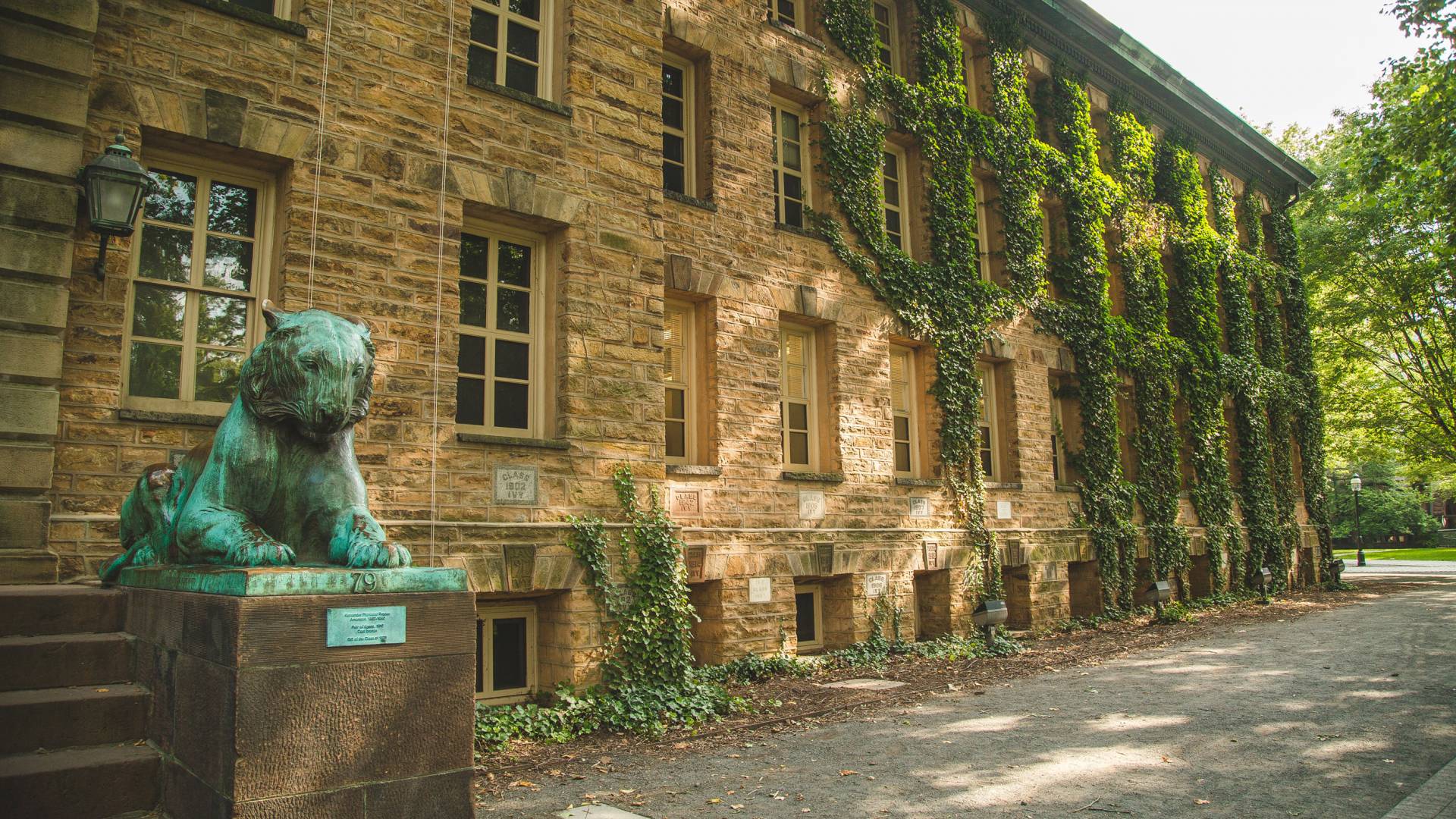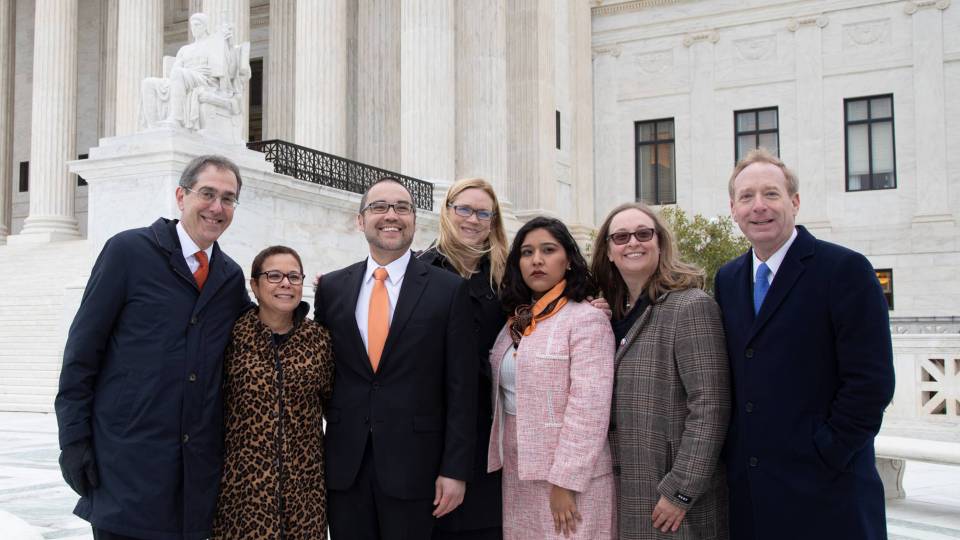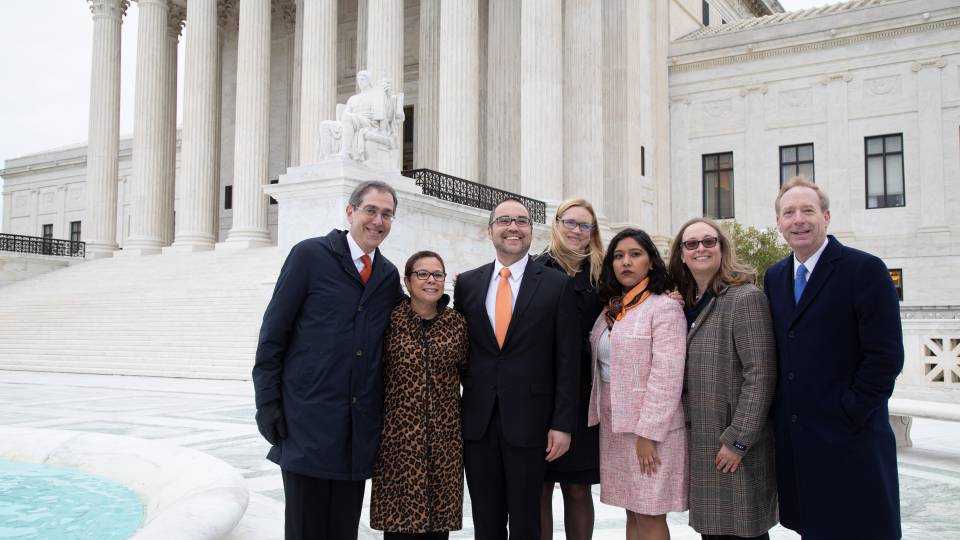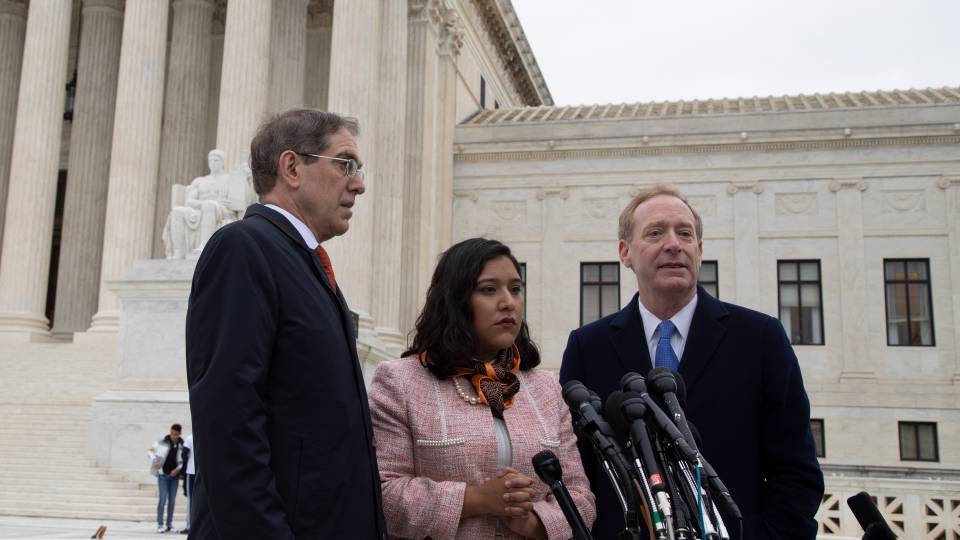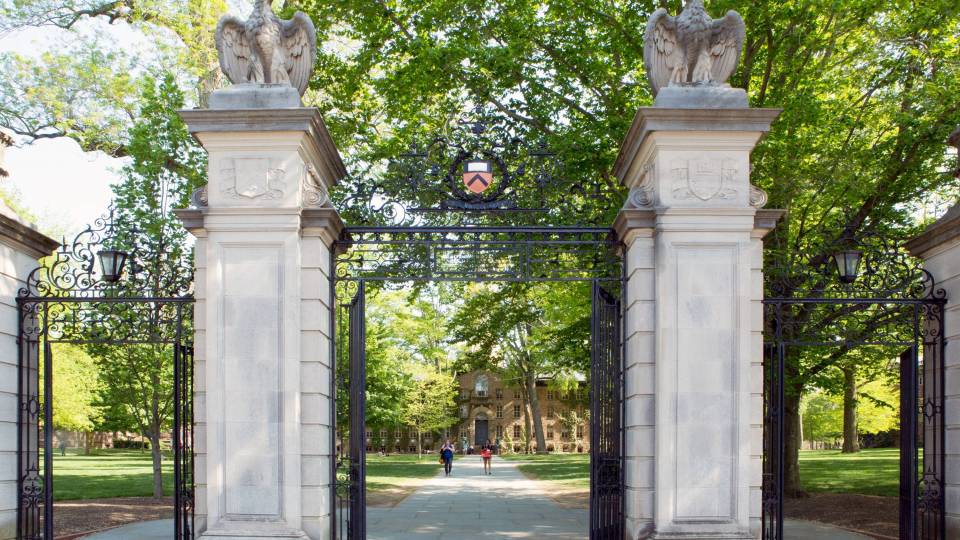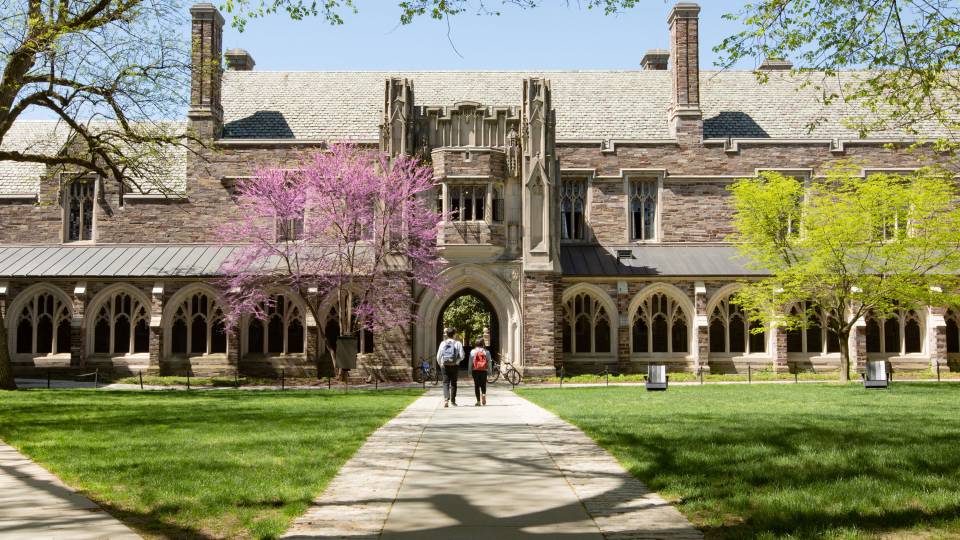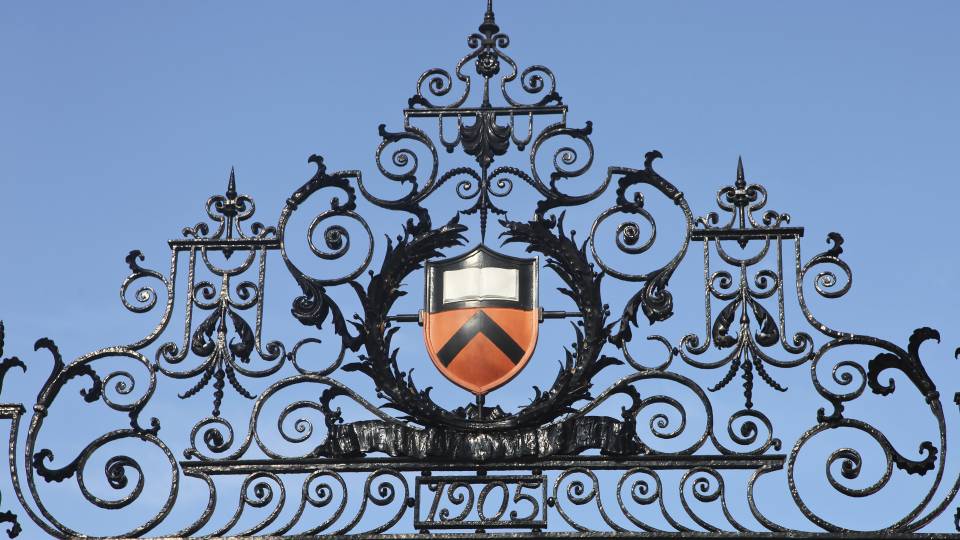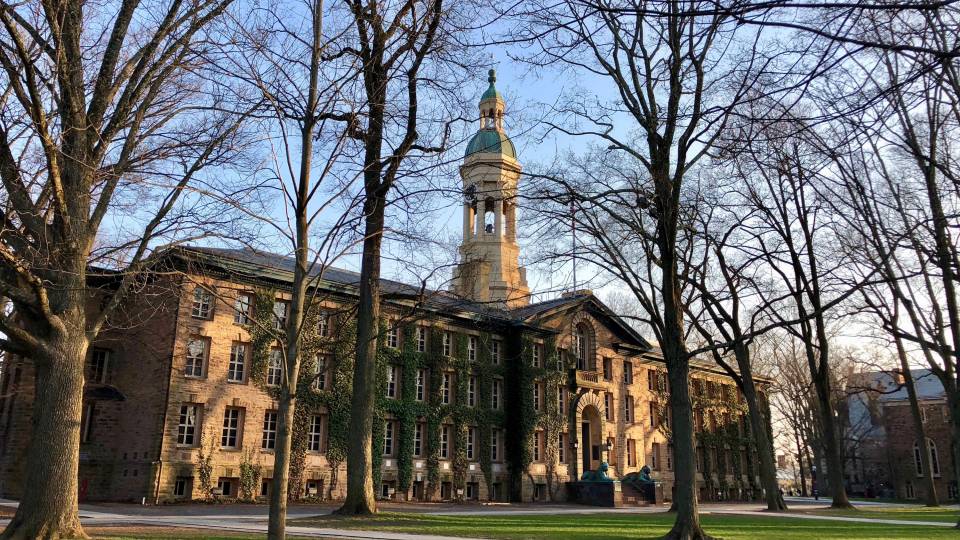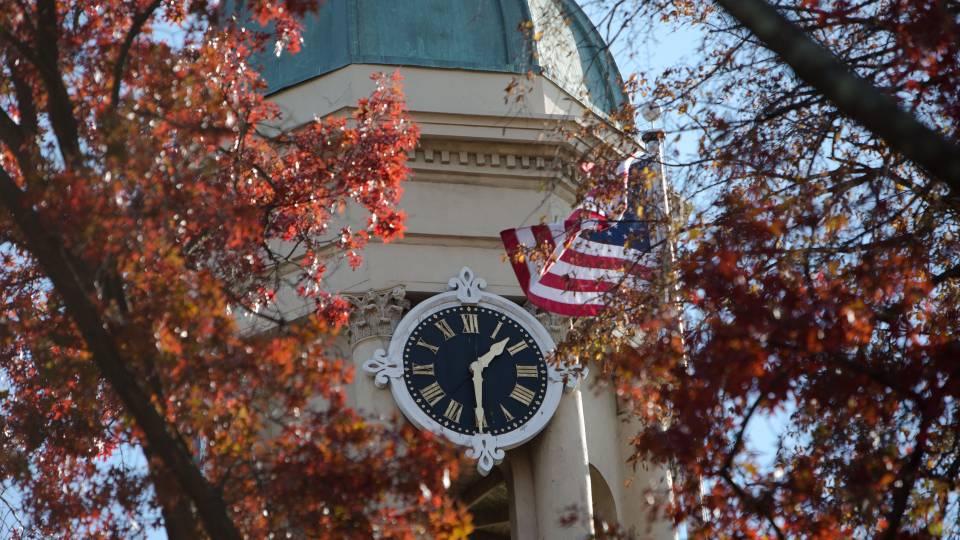An op-ed by Princeton President Christopher L. Eisgruber and Microsoft Corp. President Brad Smith on why Microsoft and Princeton University are taking their case to the Supreme Court to protect Dreamers was published in a TIME Ideas column on Nov. 10. It has been translated into Spanish.
Fighting to protect Dreamers: Why Microsoft and Princeton University are taking their case to the Supreme Court
Talent, from every source and background, is the lifeblood of innovation. As the presidents of Microsoft and Princeton University, we have seen firsthand how participants in the Deferred Action for Childhood Arrivals (DACA) program contribute to our institutions and our country. Standing up for DACA students is not only the right thing to do morally, it is also the right thing to do competitively.
That is why Microsoft and Princeton joined Dreamer María Perales Sánchez to challenge the federal government’s 2017 termination of DACA. Students like Maria, who graduated in 2018, and employees like the more than 60 Dreamers at Microsoft, should be allowed to work, study and thrive in the United States, not be forced to leave the only country they know as home.
Our two-year legal fight has now made its way to the Supreme Court, which will hear cases on November 12 related to DACA.
DACA, announced by President Obama in 2012, cleared a path for motivated students — who arrived in the United States as children — to pursue education and employment, allowing them to meet their full potential and contribute positively to this country without fear of deportation. The Trump Administration’s unlawful rescission of DACA was a tragic mistake, one that not only hurts Dreamers and their families, but also undermines our nation’s ability to compete in a global market for talent.
Hundreds of thousands of DACA recipients grew up here, attended school, pay taxes and contribute to society. This nation’s colleges and universities, businesses, economy and communities benefit directly from the determination and aspirations of Dreamers.
Microsoft and Princeton came together to support DACA because it is a wise and humane policy. Leaders across higher education and business want a permanent solution for Dreamers because it is both an economic imperative and a humanitarian necessity.
Princeton’s continued success as a world-class university depends on our ability to attract students, faculty and staff from all backgrounds. Thirty percent of our tenured and tenure-track faculty are citizens of other countries. They make a critical difference to teaching and research on our campus, and they make a critical difference in our country’s ability to compete on a global scale. We think it is essential to stand up for the people born around the world who now contribute to America’s innovation and prosperity, including DACA recipients.
At Microsoft, DACA beneficiaries work in roles ranging from engineer to finance manager. Microsoft aims to make technology that empowers every person on the planet, and to do that, we need to better reflect the world we seek to serve. Our innovations thrive on diverse voices, experiences, and perspectives. Attracting and retaining talented people from all over the country and the world helps our company and our economy grow.
One of our Microsoft employees came to this country when he was only 4 months old. He has never known a home other than the United States. He earned a bachelor’s degree in Computer Science from California Polytechnic State University. Today, he works on one of the most important products that we create — our cloud computing service, Microsoft Azure.
Microsoft and Princeton’s challenge to the federal government’s termination of DACA is part of our institutions’ long-standing support of sound immigration policies. In a world where talent is mobile, we need to do everything we can to ensure that those who want to contribute and innovate are welcome here in the United States.
While we hope the Supreme Court will rule in our favor, we also continue to urge Congress to pass legislation that provides permanent legal protections for the full population of Dreamers. We press this point when we meet with Congressional leaders in Washington, and we will continue to support this goal no matter how the Court rules.
Legislators from both sides of the aisle have expressed support for Dreamers. We urge members of Congress to act with courage and not let a path to citizenship for Dreamers fall prey to the polarization that grips so much of society today. As our co-plaintiff María Perales Sánchez has said, a permanent legislative solution would mean that young people like her could have some control over their lives and the ability to follow their dreams.
November 12 will be an important chapter in this journey. When Dreamers gather on the steps of the Supreme Court, we will be standing with them to give voice to this vital issue.
Christopher L. Eisgruber, President, Princeton University
Brad Smith, President, Microsoft Corporation
Spanish translation
¿Por qué hemos llevado nuestra lucha hasta el Tribunal Supremo para proteger a los recipientes de DACA?
El talento, sea de cualquier fuente y origen, es el alma de la innovación. Como presidentes de Microsoft y de la Universidad de Princeton, hemos visto de primera mano cómo los participantes del programa de Acción Diferida para los Llegados en la Infancia (DACA) contribuyen a nuestra institución y nuestro país. Defender a los estudiantes de DACA no es solo lo correcto desde un punto de vista moral, sino también la mejor opción para lograr competitividad.
Por esta razón, Microsoft y Princeton se han unido a la Dreamer María Perales Sánchez para impugnar la resolución de extinción de DACA tomada por el gobierno federal en 2017. A los estudiantes como María, y a los empleados como los más de 60 Dreamers de Microsoft, se les debe permitir trabajar, estudiar y prosperar en los Estados Unidos, sin ser forzados a abandonar el único país que conocen como su hogar.
Después de dos años, nuestro litigio ha trascendido al Tribunal Supremo, que celebrará audiencias el 12 de noviembre para los asuntos relacionados con DACA.
DACA, presentado por el Presidente Obama en 2012, ha abierto el camino para que estudiantes talentosos y motivados — que llegaron a los Estados Unidos como niños y consideran este país su hogar — puedan dedicarse a la educación y al trabajo, permitiéndoles desarrollar todo su potencial y contribuir de forma positiva a este país sin miedo a la deportación. La terminación ilegal de DACA de la administración de Trump fue un trágico error, que no solamente daña a los Dreamers y a sus familias, sino que también debilita la capacidad de nuestra nación de competir en el mercado global en búsqueda de talento.
Cientos de miles de beneficiarios de DACA crecieron aquí, fueron a la escuela, pagan impuestos y contribuyen a sus comunidades. Las universidades y colegios de esta nación, sus negocios, su economía y sus comunidades se benefician directamente de la determinación y las aspiraciones de los Dreamers.
Microsoft y Princeton se han unido para apoyar DACA porque es una política sensata y compasiva. Los líderes en toda la educación superior y en los negocios quieren una solución permanente para los Dreamers ya que es al mismo tiempo un imperativo económico y una necesidad humanitaria.
El éxito continuo de Princeton como universidad a nivel mundial depende de nuestra habilidad para atraer estudiantes, profesorado y personal administrativo de todas procedencias. El treinta por ciento de nuestros profesores permanentes y profesores aspirantes a obtener la permanencia son ciudadanos de otros países. Suponen una diferencia crucial en la enseñanza y la investigación en nuestro campus, y marcan la pauta en la capacidad de nuestro país para competir a escala global. Creemos que es esencial apoyar a las personas nacidas por todo el mundo que ahora contribuyen a la innovación y prosperidad de América, incluyendo a los recipientes de DACA.
En Microsoft, los beneficiarios de DACA trabajan en varias funciones, desde ingenieros hasta directores financieros, contribuyendo de forma importante a la compañía todos los días. Microsoft aspira a crear tecnología que empodere a cada persona en el planeta. Para hacer eso, necesitamos reflejar mejor el mundo al que pretendemos servir. Nuestras innovaciones prosperan a través de diversas voces, experiencias y perspectivas. Atraer y retener a gente talentosa de todas partes del país y del mundo ayuda a que crezca nuestra empresa y nuestra economía.
Uno de nuestros empleados de Microsoft vino a este país con tan solo cuatro meses de edad. Nunca ha conocido otro hogar que no fuera los Estados Unidos. Se graduó de la Politécnica de California con un título en informática. Hoy, trabaja en uno de los productos más importantes que creamos — nuestro servicio de informática en la nube, Microsoft Azure.
La impugnación por parte de Microsoft y Princeton de la resolución del gobierno federal para poner fin a DACA es parte del apoyo de larga tradición de nuestras instituciones a las políticas sensatas de inmigración. En un mundo donde el talento se mueve, necesitamos hacer todo lo posible para asegurarnos que aquellos que quieran contribuir e innovar sean bien recibidos aquí en los Estados Unidos.
Mientras esperamos que el Tribunal Supremo falle a nuestro favor, continuamos instando al Congreso a que apruebe una ley que proporcione protección legal permanente a toda la población de Dreamers. Insistimos en esto cuando nos reunimos con líderes del Congreso en Washington, y continuaremos respaldando este objetivo sea cual sea la decisión del Tribunal.
Los legisladores de ambos partidos han expresado apoyo a los Dreamers. Urgimos a los miembros del Congreso a que actúen con valor y a que no permitan que la vía a la ciudadanía de los Dreamers sea víctima de la polarización que se ha apoderado de una parte tan grande de la sociedad de hoy. Como nuestra co-demandante María Perales Sánchez ha dicho, una solución legislativa permanente significaría que personas jóvenes como ella podrían controlar sus propias vidas y perseguir sus sueños.
El 12 de noviembre será un capítulo importante de este periplo. Cuando los Dreamers se reúnan en los escalones del Tribunal Supremo, estaremos a su lado para hacernos eco de este asunto vital.
Christopher L. Eisgruber, Presidente, Universidad de Princeton
Brad Smith, Presidente, Corporación Microsoft
